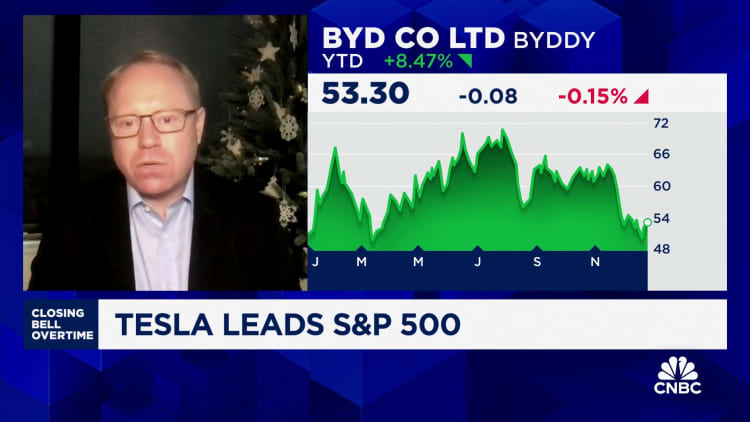
[ad_1]
BYD launched the BYD Seal in Europe at the IAA auto show in Munich, Germany. The electric sedan has a starting price of 44,900 euros ($48,479).
Arjun Kharpal | CNBC
BEIJING — BYD said Monday it produced more than 3 million new energy vehicles in 2023, putting the Chinese electric car giant on track to surpass Tesla‘s production for a second straight year.
The U.S. electric car company had yet to release full-year figures as of Tuesday in Asia. Tesla said it produced 1.35 million cars during the first three quarters of 2023.
In 2022, Tesla produced 1.37 million vehicles, fewer than BYD’s 1.88 million. New energy vehicles include battery-powered and hybrid models.
Most of BYD’s cars sell in a lower price range than Tesla’s, and come in hybrid versions. Elon Musk’s automaker only sells purely battery-powered cars. China accounted for about one-fifth of Tesla’s sales in the quarter ended Sept. 30.
BYD shares fell by more than 2% in Hong Kong trading Tuesday morning.

Competition heats up
Companies wanting a slice of China’s fast-growing electric car market have flooded the market with new models. Chinese smartphone maker Xiaomi last week detailed its plans to launch an EV to compete with Porsche and Tesla.
Li Auto, whose monthly deliveries have surged to record highs, is set to launch its first purely battery-powered vehicle, MEGA, on March 1 and begin deliveries later that month, according to an announcement Sunday. That’s slightly later than initial projections for late February deliveries.
The startup has so far seen success with cars that come with a fuel tank to charge the battery and extend driving range. Li Auto said it delivered more than 50,000 cars in December for a total of 376,030 cars in 2023, a 182% year-on-year increase.

Xpeng on Monday launched its X9 MPV, with deliveries starting immediately.
The Chinese EV maker said its overall deliveries of electric cars rose 17% year-on-year to 141,601 cars in 2023, with a record 20,115 vehicles delivered in December.
Huawei’s new energy vehicle brand Aito said Monday that orders for its M9 SUV have surpassed 30,000 in the seven days since its launch. M9 mass deliveries are set to begin in late February.
Aito said it delivered 94,380 cars in 2023, including 24,468 in December alone. For 2022, Aito said it delivered more than 75,000 cars since beginning deliveries in March that year.
Zeekr, backed by Geely, said it started Monday to deliver its latest model, the 007 electric sedan. Zeekr said its overall deliveries rose by 65% in 2023 to 118,685.
That total figure is still lower than Nio’s, which said it delivered 160,038 cars in 2023, up by nearly 31% year-on-year. The company delivered just over 18,000 cars in December.
Among the many other electric car brands in China, Nezha reported deliveries of 127,496 cars in 2023.
Aion, a spin-off of state-owned GAC Motor, said it sold more than 480,000 cars in 2023, up 77% year-on-year.
Overseas expansion
Several Chinese electric car players including Nio and BYD are also pushing into markets outside China, especially Europe.
BYD’s overseas sales in 2023 exceeded 242,000 new energy passenger vehicles, according to CNBC calculations of public data. The company did not disclose comparable 2022 figures.
The Chinese EV giant announced plans in December to build a new production center in Hungary. The company said it currently sells five models in Europe and plans to launch three more for the region in the next 12 months.
“While the China market is one of the pioneers entering into the era of EVs, we believe moving overseas (building factories in the overseas market rather than just shipping vehicles manufactured in China) is the only way for China’s leading carmakers to achieve success in the global market in the long run,” Nomura China autos analyst Joel Ying and a team said in a Jan. 2 note.
“Given the company already has a bus factory in Hungary, we believe the decision to build the first EU PV factory in Hungary will help BYD to minimize the potential risks in the overseas market,” the report said.
BYD said it sold 36,095 new energy passenger vehicles overseas in December, more than triple the year-ago figure.
— CNBC’s Michael Bloom contributed to this report.

[ad_2]
Source link